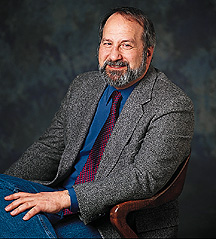

What a great place for a classroom.

Three undergraduates and three graduate students from the UW will accompany this summer's expedition funded by the National Science Foundation and led by Ted Pietsch, professor with the School of Fisheries. The students will work alongside 25 scientists from the United States, Japan and Russia, just as students have done each of the last five years.
Whether standing before a roomful of students or by a stream of 90-degree water explaining how to net heat-loving fish called "gobies"--Pietsch's ability to weave together research and teaching earned him a 1998 Distinguishing Teaching Award.
"Pietsch's talks could never be construed as the presentation of a list of scientific 'facts.' Rather, his ability to integrate information with the history of science and scientific personalities and to emphasize science as a dynamic endeavor broadens the perspective of the topic beyond ichthyology," wrote a fisheries graduate student.
Pietsch's courses include "Biology of Fishes," a basic science course he has team taught with Fisheries Professor Chris Foote for the past four years.
Foote says one reason Pietsch is such a good teacher is because he is so well prepared. "For each class, he provides for the students a complete (I mean complete!) set of notes in the library, so that they don't have to waste time taking notes. As such, he presents more material per lecture than normal and the students learn more. "
Pietsch also is curator of the UW fish collection. Every quarter undergraduates work with Pietsch and Collections Manager Brian Urbain. The collection focuses on fish of the Pacific Northwest and Alaska but includes specimens from around the world. A 1995 survey showed that the UW collection was the fifth most-heavily used collection in North America.
Sets of specimens are especially set aside for use by students, both those attending the UW and other colleges, as well as younger students in grades K-12.
"Ted has often voiced to me his belief that young people can be attracted to the sciences by exposing them to natural history when they are in the K-12 system," wrote David Armstrong, professor of fisheries. "Ted has used the extensive facilities of the School of Fisheries collection as the basis for tours and lectures for school groups--young people at an age when their imaginations are attracted by fish with such a diversity of odd forms and shapes or those with strange lifestyles, and by the mix of science and adventure behind collections and museums."--Sandra Hines, UW News and Information
Return to the Beginning of "The Best of 1998"
Send a letter to the editor at columns@u.washington.edu.